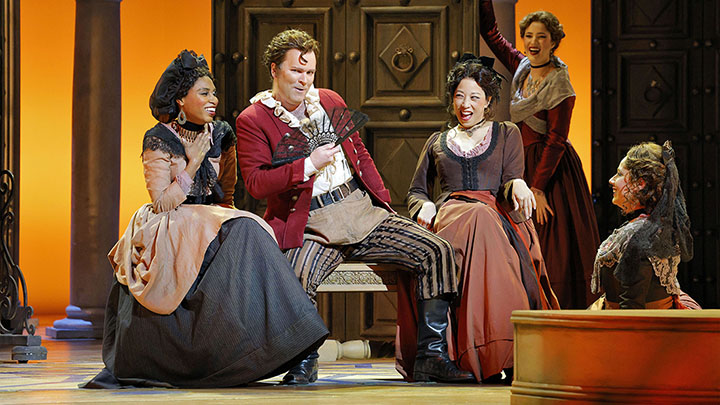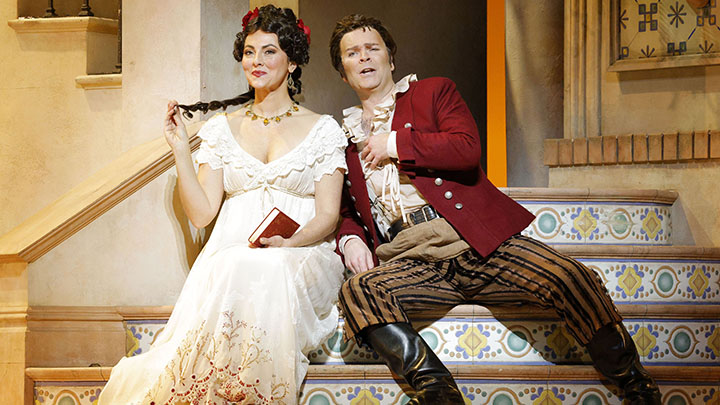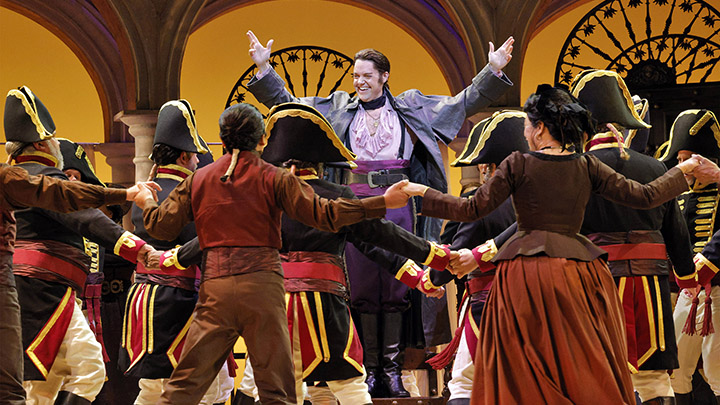
His only opera that has regularly held the stage since its premiere is often given less than proper attention both musically and in its staging since even a half-hearted attempt often proves enough to fill seats. My respect for the maestro’s work is great. In a scant 23 years he managed to compose nearly 39 operas then retired to live out the next forty years in Paris (mostly) and comfort (assuredly). Also, when Rossini was composing, opera was generally a much more local experience and often tailored to the singers at hand. Later the publishing houses made it a much larger enterprise which is one of the presumed reasons he took his leave when he did.
This tremendous output was helped not a little by the fact that Rossini scavenged eagerly from his own compositions on a regular basis (since everything was so local) and often employed assistants to fill out lesser character arias and the recitativo. One of the best examples of this is that, apparently because the original had been misplaced or lost after the premiere, every performance of the Barber actually begins with the overture the master had already used for Aureliano in Palmira AND Elisabetta, regina d’Inghilterra (!). Saturday night at the Music Center was no exception.
Our evening’s conductor, Louis Lohraseb, who is a distinguished alumnus of LA Opera’s young artists program, made a promising debut last year with Tosca filling in at the near last moment. The sweep of Puccini’s romantic line is several musical world’s away from the clockwork precision of Rossini’s musical architecture and the famous overture ended far better than it began once the tempo was adjusted mid-way at the repeat. As the evening progressed however, the LA Opera Orchestra played beautifully, with exceptional attention to detail, and some surprising ornamentation (some of which was more elegantly rendered than others). Maestro Lohraseb obviously believes in the generous (and, I must say, refreshing) use of musical graces but not gratuitous high notes and his able cast clearly benefited from this approach.
The benefit was ours in the luxury casting of Luca Pisaroni as the music master Basilio making his LA Opera debut. In a role normally farmed out to someone whose gifts may be more on the decline he offered a vigorous characterization with supple and commanding singing that willingly embraced the humor of his role. Also, as one of only two native Italians in the cast, his diction was exemplary and a pleasure to the ear.
I wish I could say the same for our Dr. Bartolo, Paolo Bordogna. In spite of excellent comic timing, which led to increasingly more hilarious interactions with his castmates, his patter seemed to get away from him on Saturday night more often than not. His singing was also uncommonly strong and he did distinguish himself in the recits. Since he’s a buffo specialist (with a solo Decca recording of same which I plan to seek out), I’m chalking it up to opening night nerves.
No nerves were apparent from Joshua Hopkins, our Figaro, who debuted here in Matthew Aucoin’s Eurydice as Orpheus in 2020. He more than proved his versatility in the Rossini with a performance of enormous vocal and physical flexibility which found him disappearing and reappearing in plain sight with a cartoon character’s dexterity. He easily dispatched all of the many vocal hurdles in his path with aplomb and sang with an ideal command and beauty of tone along with some very hilarious word pointing.
I think we had a nearly complete musical performance, minus some trimming in the rectis, and thankfully the tenor’s final bravura aria “Cessa di piu resistere” was restored to its rightful place providing a showcase for our Almaviva, Edgardo Rocha. Although he didn’t venture into the stratosphere (in keeping with proper Rossinian performance practice) he did display a very fine Tenore di grazia and deft comic ability. He was absolutely hilarious in the opening scene in a Flamenco inspired “Se il mio nome saper voi bramate” (and I tip my Cordoban to guitarist Paul Viapiano for his brilliant accompaniment). His piano singing and messa di voce effects were extraordinarily sweet and carried beautifully into the theater. He also accomplished two of the most elegantly realized trills I’ve ever heard from any male singer of any voice type. I bow low.
I have to say that my primary focus going into this performance was on our Rosina mezzo-soprano Isabel Leonard. Due to my own illness and then hers, I was very sorry to miss her company debut as Donna Elvira in the recent Don Giovanni. She’s been featured in the Met Live in HD series a number of times and I’ve always enjoyed her performances. Still, you never get the measure of a voice, no matter how well recorded, until you hear it live. She did a little off-roading during, “Una voce poco fa” in her decorations but as the performance progressed so did her resonance and rhythmic finesse. The voice continued to bloom in warmth and beauty all evening most especially as she headed downward on the scale. She’s a skilled comedian and perfectly balanced her exasperation with her guardian for comic effect. She also pulled off a hilarious comic bit where she pretended to twist her ankle as a distraction from the onstage machinations around her.
I do have to single out Kathleen O’Mara who played the housekeeper Berta for special mention. When you’re the only soprano onstage it’s easy to be heard over a chorus of men and one mezzo in the Act I finale. When I heard the quality of the voice I said a silent prayer that she’d actually get to sing her little sorbet aria, “Il vecchiotto cerca moglie”. I can’t honestly say she walked away with the entire performance with a single aria but she came damn close. This is a sizable voice with near perfect placement, a gorgeous clear sound, and very, very, clean passagework. My sincerest hopes for her continued success.
The production originated at Lyric Opera of Chicago back in 2014 where it was directed by Rob Ashford who also oversaw the revival here. Mr. Ashford has a long list of credits on both sides of the pond, a string of mega-musicals to his name, a Tony Award, and the special distinction of having directed both The Sound of Music Live! and Peter Pan Live! For NBC which I won’t hold against him (much). His blocking was clear and he certainly made the story easy to comprehend even if you weren’t paying attention to the supertitles (which although they were liberally translated didn’t contradict the story). My problem with his direction was the addition of superfluous elements that distracted from his singers. Figaro made his entrance accompanied by five (single?) women who really served no other purpose than to provide a little back-up choreography during the “Largo al factotum” and shift the set around a bit. Later at the end of the scene while our tenor and baritone were negotiating the fiendishly tricky “All’idea di quel metallo”, Mr. Ashford turned the whole affair into a parade of wrought-iron doors on silent casters and potted palms that went on far too long and obliterated the fine work of his singers. The finale however built to a wonderful conclusion with the most carefully choreographed puffs of flower petals thrown into the air by the supporting cast and it was a simple moment of theatrical magic.
This mostly efficient set by Scott Pask was designed to move far more than it actually needed to but evoked 18th century Spain prettily enough. There was however a large sunken pond in the middle of Dr. Bartolo’s study which added atmosphere but merely ended up being underutilized. Sheer curtains pulled across the rear provided an excellent accompaniment for the Act 2 storm as did the Thudersheet in the timpani section in the pit (something I’ve never seen before).
I’ve admired Catherine Zuber’s costumes on many occasions despite this being only her third LA Opera production since 1997’s Florencia en el Amazonas. Her work here flattered everyone involved and moved beautifully, most especially on Ms. Leonard.
So if you’re looking for a musically satisfying romp in old Seville I don’t think you’ll get much better than this very well-conducted and sung production for quite some time and five performances remain through November 12th.
Photos: Cory Weaver




























Comments